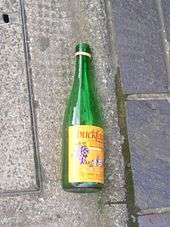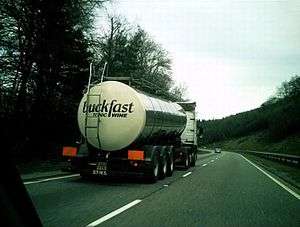Buckfast Tonic Wine
.jpg)
Buckfast Tonic Wine, commonly known as Buckfast or Buckie, is a fortified wine with caffeine, licensed from Buckfast Abbey in Devon and distributed by J. Chandler & Company in the United Kingdom and Grants of Ireland in Ireland.
The drink has become a subject of controversy in Scotland due to its links with ned culture; a senior politician labelled it as "a badge of pride amongst those who are involved in antisocial behaviour".[1]
Buckfast is very popular in Scotland, the sales of the product were monitored in 2014 by the Scottish government to see if the "Buckfast Triangle" still stood. The test showed that the towns and cities where Buckfast was sold highest per capita were, in order, Glasgow and the surrounding areas, East Kilbride, Hamilton, Cambuslang, and Coatbridge, all of which are in the northern areas of Lanarkshire, excepting Glasgow.
History
The wine, which is still manufactured using many of the same ingredients, is based on a traditional recipe from France. The Benedictine monks at Buckfast Abbey first made the tonic wine in the 1890s. It was originally sold in small quantities as a medicine using the slogan "Three small glasses a day, for good health and lively blood".[2]
In 1927, the Abbey lost its licence to sell wine. As a result, the Abbot allowed wine merchants to distribute on behalf of the Abbey. At the same time, the recipe was changed to be less of a patent medicine and more of a medicated wine.[2]
The wine, which comes in distinct brands depending on the market, has achieved popularity in working class, student, and bohemian communities in the United Kingdom and Ireland. In the Republic of Ireland, Buckfast is packaged in a darker bottle, has a slightly lower alcoholic strength, and lacks the vanillin flavouring present in the British version. Buckfast sold in Northern Ireland is the same as that sold in the rest of the UK.[3]
Versions
Buckfast contains 15% alcohol in the 750 ml green-bottled UK version, and 14.8% in the brown-bottled Republic of Ireland version, which equates to roughly 11.25 UK units of alcohol.
Both versions of the drink contain phosphate and glycerophosphate (each of these as the sodium and/or potassium salt).
The "brown bottle" Buckfast has a caffeine content about equal to brewed or percolated coffee, while the "green bottle" Buckfast has a caffeine content about equal to black tea.[4][5] However independent research says the "green bottle" Buckfast contains the same amount of caffeine as six cups of coffee and Buckfast—drop for drop—has more caffeine in it than Red Bull.[6]
Sold in the United Kingdom.
|
Sold exclusively within the Republic of Ireland.
|
Controversy in Scotland

In Scotland, Buckfast is recognised as the favoured drink of neds:[7][8] young people who are associated with hooliganism, casual sports clothing and stupidity.[9] Its ties to anti-social behaviour, especially with drinkers under 18 years old, have been attributed to its very high caffeine content: each 750ml bottle contains the equivalent of eight cans of cola.[10] It has been suggested that this may cause it to act as a stimulant at the same time as removing inhibitions, self-control and a feeling of having drunk enough, though research into similar drinks has failed to find clear evidence for the latter effect.[11] A diet of four bottles a day has been described as 'not conducive to a long life' in a Scottish court.[12]
The beverage has entered the popular lexicon with nicknames such as "Wreck the Hoose Juice",[13][14][15] "Commotion Lotion",[13][14] "Cumbernauld Rocket Fuel",[14] "Mrs. Brown",[13] "Buckie Baracas",[16] "Coatbridge Table Wine",[16] and a bottle of "what the hell are you looking at?"[16] It has also earned the unofficial slogan, "Buckfast: gets you fucked fast".[15] The drink's prominence within the "Buckfast/Buckie Triangle" – an area east of Glasgow between Airdrie, Coatbridge and Cumbernauld – has raised concern.[15][16] In addition, the glass bottle has been blamed for contributing to litter and providing drunkards with a weapon.[14][16]
Several Scottish politicians and social activists have singled out Buckfast Tonic Wine as being particularly responsible for crime, disorder, and general social deprivation in these communities. Although Buckfast accounts for only 0.5% of alcohol sales in Scotland, the figure is markedly higher in Lanarkshire.[17][18] Helen Liddell, former Secretary of State for Scotland, called for the wine to be banned. In 2005, Scottish Justice Minister Cathy Jamieson suggested that retailers should stop selling the wine. On a subsequent visit to Auchinleck within her constituency, she was greeted by teenagers chanting, "Don't ban Buckie".[19] Jamieson then received correspondence from lawyers acting for Buckfast distributors, J. Chandler & Company, in Andover.[20] A further consequence was that Buckfast sales increased substantially in the months following Jamieson's comments.[18]
In September 2006, Andy Kerr, the Scottish Executive's Health Minister, described the drink as "an irresponsible drink in its own right" and a contributor to anti-social behaviour. The distributors denied the claims and accused him of showing "bad manners" and a "complete lack of judgement" regarding the drink.[21] Kerr met with J. Chandler & Company to discuss ways of lessening Buckfast's impact on west Scotland but the talks broke up without agreement. Three months later, Jack McConnell, First Minister of Scotland stated that Buckfast had become "a badge of pride amongst those who are involved in antisocial behaviour."[1] In response the distributors accused the Scottish Executive of trying to avoid having to deal with the consequences of failed social policy and the actual individuals involved in antisocial behaviour by blaming it on the drinks industry."[1]
In January 2010, a BBC investigation revealed that Buckfast had been mentioned in 5,638 crime reports in the Strathclyde area of Scotland from 2006–2009, equating to an average of three per day. One in 10 of those offences had been violent and 114 times in that period a Buckfast bottle was used as a weapon. A survey at a Scottish young offenders’ institution showed of the 117 people who drank alcohol before committing their crimes, 43 per cent said they had drunk Buckfast. In another study of litter around a typical council estate in Scotland, 35 per cent of the items identified as rubbish were Buckfast bottles.[7][22]
Manufacturer's response
The monks of Buckfast Abbey and J. Chandler & Company, their distribution partner, deny that their product is particularly harmful, saying that it is responsibly and legally enjoyed by the great majority of purchasers. They also point out that the areas identified with its acute misuse have been economically deprived for decades and Buckfast represents less than one per cent of the total alcohol sales across Scotland.[23] Abbot of Buckfast Abbey, David Charlesworth, has emphasised that the tonic wine his monastery produces "is not made to be abused."[24]
In February 2013, J. Chandler & Company applied to the Court of Session in Edinburgh to stop Strathclyde Police from marking bottles of Buckfast so they could trace where under-age drinkers bought them. A company spokesman complained, "This is discrimination at the highest level. Buckfast is no more involved in crime than any other brand of alcohol." A former head of the Scottish Police Federation said: "Buckfast, the distributors and the lawyers who act on behalf of the monks refuse, point blank, to take any responsibility for the antisocial behaviour that's caused by the distribution and the consumption of Buckfast. They even refuse to change the glass bottles to plastic bottles despite overwhelming evidence that large areas in play parks and certain areas in Scotland are littered with this green glass."[25][26]
In February 2014, the case was settled without any judgment being made by the court. Assistant Chief Constable Wayne Mawson of Police Scotland apologised to J. Chandler & Co for asking a shopkeeper to stop selling Buckfast and gave written undertakings not to include the product in any bottle-marking scheme unless it has "reasonable grounds" for doing so, and "not to request licensed retailers, situated anywhere in Scotland, to cease stocking for sale Buckfast Tonic Wine".[27]
See also
- Flavored fortified wines
- Ned
- Vin Mariani, a wine fortified with cocaine endorsed by Pope Leo XIII
- Parish ale, a British tradition of beer production by the church
- Ban on caffeinated alcoholic beverages, a list of bans on similar products
References
- 1 2 3 Macdonell, Hamish (2006-11-20). "McConnell joins the war of words on Buckfast, 'a seriously bad drink'". The Scotsman. Retrieved 2010-12-27.
- 1 2 "History of the Tonic Wine". Buckfast Abbey. Retrieved 26 December 2013.
- ↑ McKittrick, David (2006-12-08). "Ireland demands tougher taxes on dreaded 'Buckie'". The Independent on Sunday. London. Retrieved 2010-01-24.
- ↑ "Caffeine Content of Food and Drugs". Nutrition Action Health Newsletter. Center for Science in the Public Interest. December 1996. Archived from the original on 2007-06-14. Retrieved 2009-02-04.
- ↑ "Caffeine Content of Beverages, Foods, & Medications". Erowid. 2009-08-17. Retrieved 2010-12-27.
- ↑ http://www.bbc.co.uk/iplayer/episode/b00tthry/Britains_Really_Disgusting_Drinks/ |accessdate=2010-09-17
- 1 2 Lyall, Sarah (3 February 2010). "For Scots, a Scourge Unleashed by a Bottle". The New York Times. The New York Times Company. Retrieved 14 April 2014.
- ↑ Johnston, Jenifer (24 September 2006). "Kerr seeks meeting with Buckfast firm". Sunday Herald. Retrieved 13 April 2014.
[Buckfast] has attracted the tag of being the tipple of choice for neds.
- ↑ "Neds make it into the dictionary". BBC News. 9 June 2005. Retrieved 10 August 2013.
- ↑ Macleod, Fiona (2010-01-18). "Crime link as Buckfast revealed to have as much caffeine as eight colas". The Scotsman. Retrieved 2010-12-27.
- ↑ Benson, Sarah; Verster, Joris C.; Alford, Chris; Scholey, Andrew (2014). "Effects of mixing alcohol with caffeinated beverages on subjective intoxication: A systematic review and meta-analysis". Neuroscience & Biobehavioral Reviews. 47: 16–21. doi:10.1016/j.neubiorev.2014.07.008. ISSN 0149-7634.
- ↑ "Drinking four bottles of Buckfast a day 'not conducive to a long life' sheriff tells Dunfermline man". Dunfermline Press. 27 October 2016.
- 1 2 3 "Court threat over monks' tipple". BBC News. 14 February 2005. Retrieved 2009-11-04.
- 1 2 3 4 Grundhauser, Eric (19 March 2015). "'Wreck the Hoose Juice': The Monks' Wine That Fuels Hooliganism". Slate. The Slate Group. Retrieved 15 April 2015.
- 1 2 3 Beck, John (15 October 2013). "A Voyage into the World of Buckfast: the Drink That Gets You Fucked Fast". Vice. Vice Media, Inc. Retrieved 15 April 2015.
- 1 2 3 4 5 Heald, Claire (2006-09-26). "Binge drinking - the Benedictine connection". BBC News.
- ↑ Lyall, Sarah (February 3, 2010). "For Scots, a Scourge Unleashed by a Bottle". New York Times. Retrieved 2010-02-05.
- 1 2 Macmillan, Arthur (2005-05-08). "Buckfast Sales Surge". The Scotsman. Retrieved 2010-12-27.
- ↑ "Buckfast yobs give Jamieson hard time". Archived from the original on 2006-03-10. Retrieved 2005-08-30.
- ↑ Jamieson, Cathy (2005-03-03). "Letter from the Minister for Justice to Angus G MacLeod" (PDF). Scotland.gov.uk. Retrieved 2010-12-28.
- ↑ Macmillan, Arthur (2006-09-24). "Health minister condemns Buckfast tonic wine". Scotland on Sunday. Retrieved 2010-12-27.
- ↑ "Buckfast 'in 5,000 crime reports'". BBC News. 2010-01-18. Retrieved 2010-04-27.
- ↑ "Monks reject crime link to wine". BBC News. 2010-02-01. Retrieved 2010-04-27.
- ↑ "Buckfast monks reject blame for 'tonic wine crime'". BBC News. 25 December 2013.
- ↑ "Buckfast tonic wine takes police force to court". The Scotsman. Retrieved 26 December 2013.
- ↑ "Buckfast tonic wine takes police to court". the drinks business . 25 February 2013.
- ↑ Campbell, Glenn (1 February 2014). "Police Scotland apologise in Buckfast tonic wine case". BBC Scotland news. Retrieved 1 February 2014.
External links
| Wikimedia Commons has media related to Buckfast Tonic Wine. |
